Abstract
OBJECTIVE. We compared the validity of hospital admission and length of stay reports from patients, outpatient providers, and hospitals, and we examined possible sources of error. DATA SOURCES. Data were collected from people enrolled in a randomized trial of treatment for severe mental illness and substance use disorders, from community mental health centers (CMHCs), and from hospitals. Reports for each of the 74 study participants covered two-year time periods beginning and ending at various times between 1989 and 1993. STUDY DESIGN. We compared reports from the various sources and constructed a hybrid with data from all three sources. Using parametric and non-parametric statistics, we compared patient, CMHC, and hospital reports with each other and with the hybrid source. In subsequent regression analyses we explored correlates of reporting accuracy. PRINCIPAL FINDINGS. Single-source reports underestimated hospital use, but when patient and CMHC reports were combined, results were very similar to those obtained by the more laborious hybrid method. Patient reports became less accurate as the time between discharge and reporting increased; people with bipolar disorders reported admissions with greater accuracy than did people with schizophrenia. CMHC reporting accuracy decreased as the distance to the admitting hospital increased and were less accurate for people with more severe psychiatric symptoms. CONCLUSIONS. Reports from single sources are likely to underestimate hospital use for different reasons. Combining carefully collected data from patients and outpatient providers produces estimates of hospital use that are substantially the same as those developed through methods that are more laborious and costly.
Full text
PDF

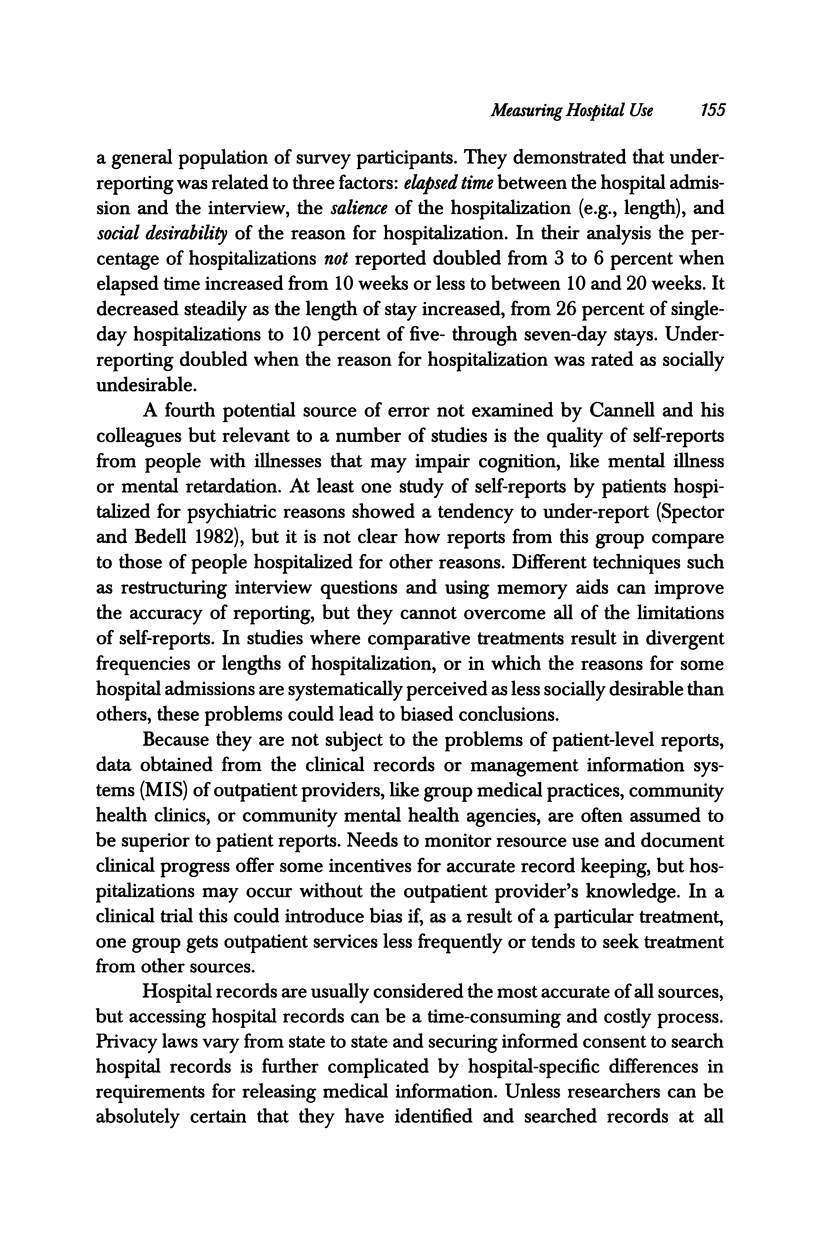


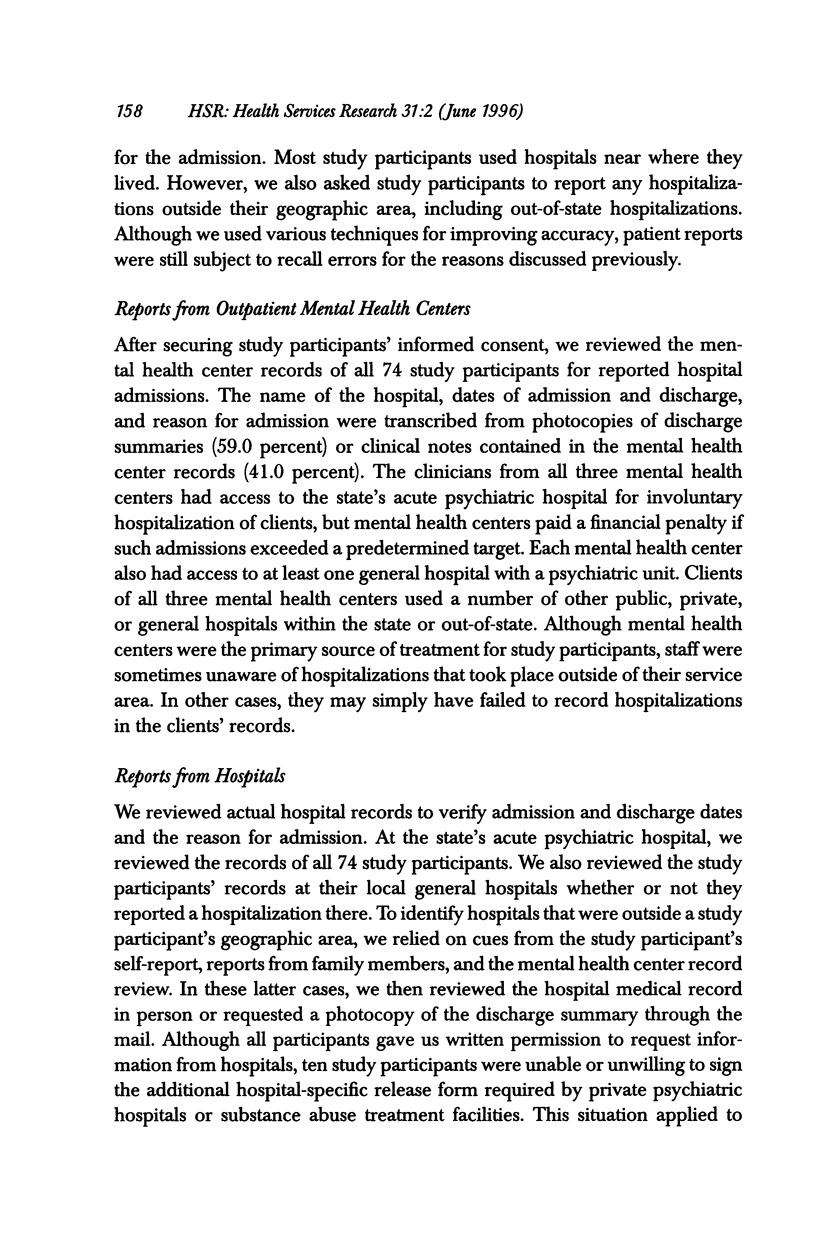




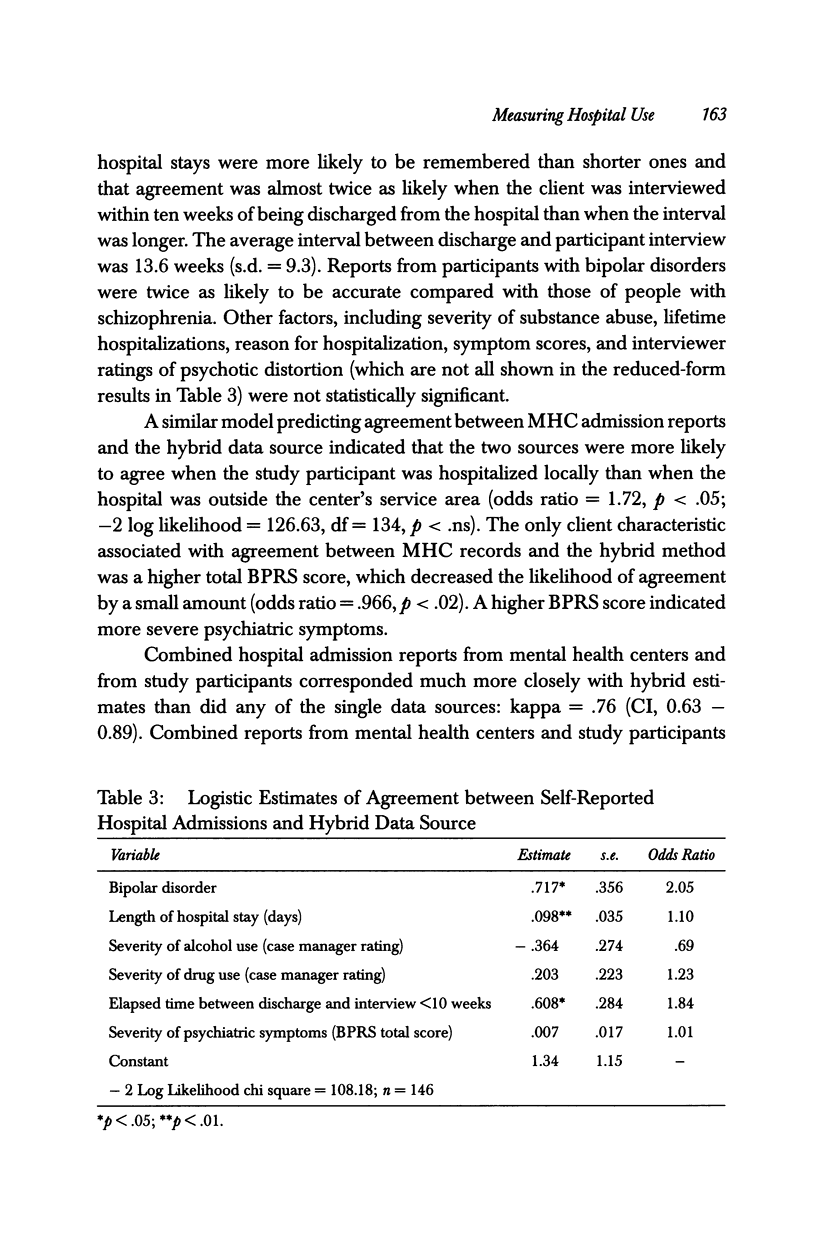
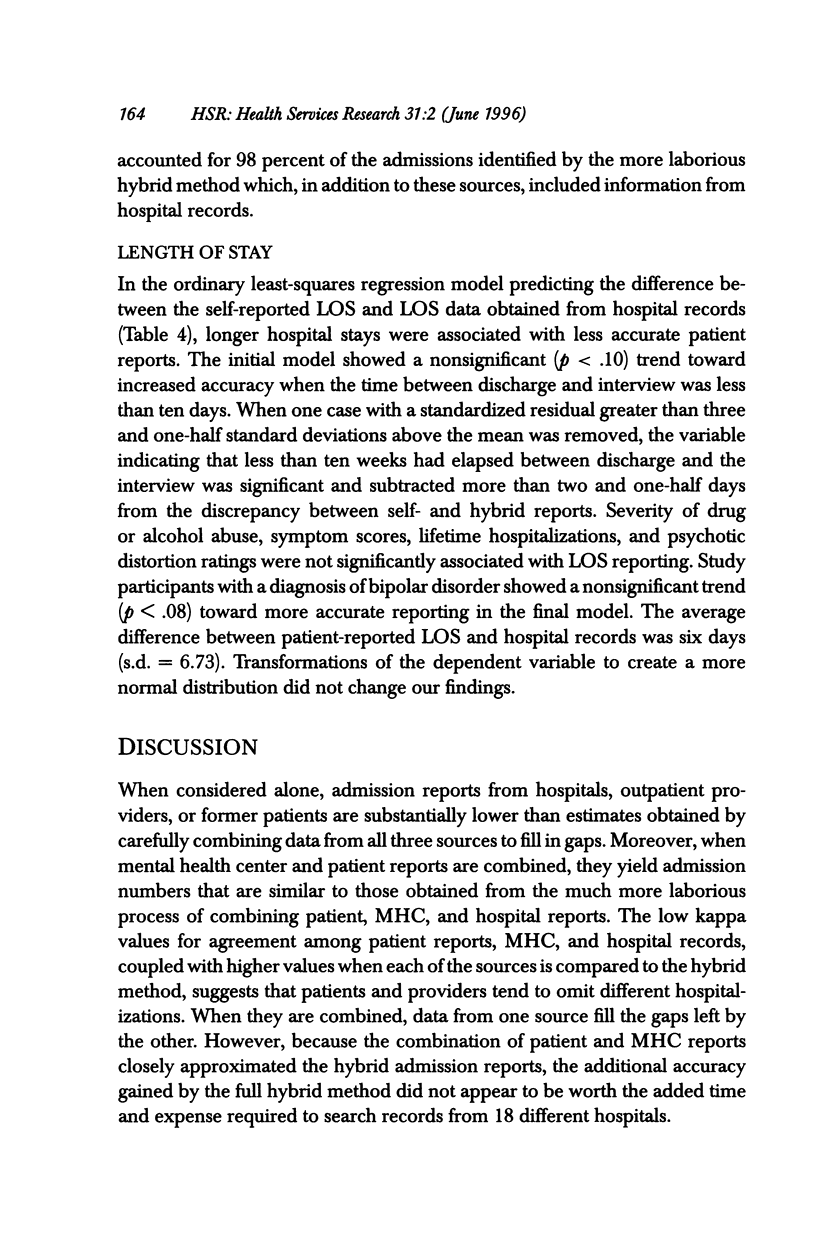

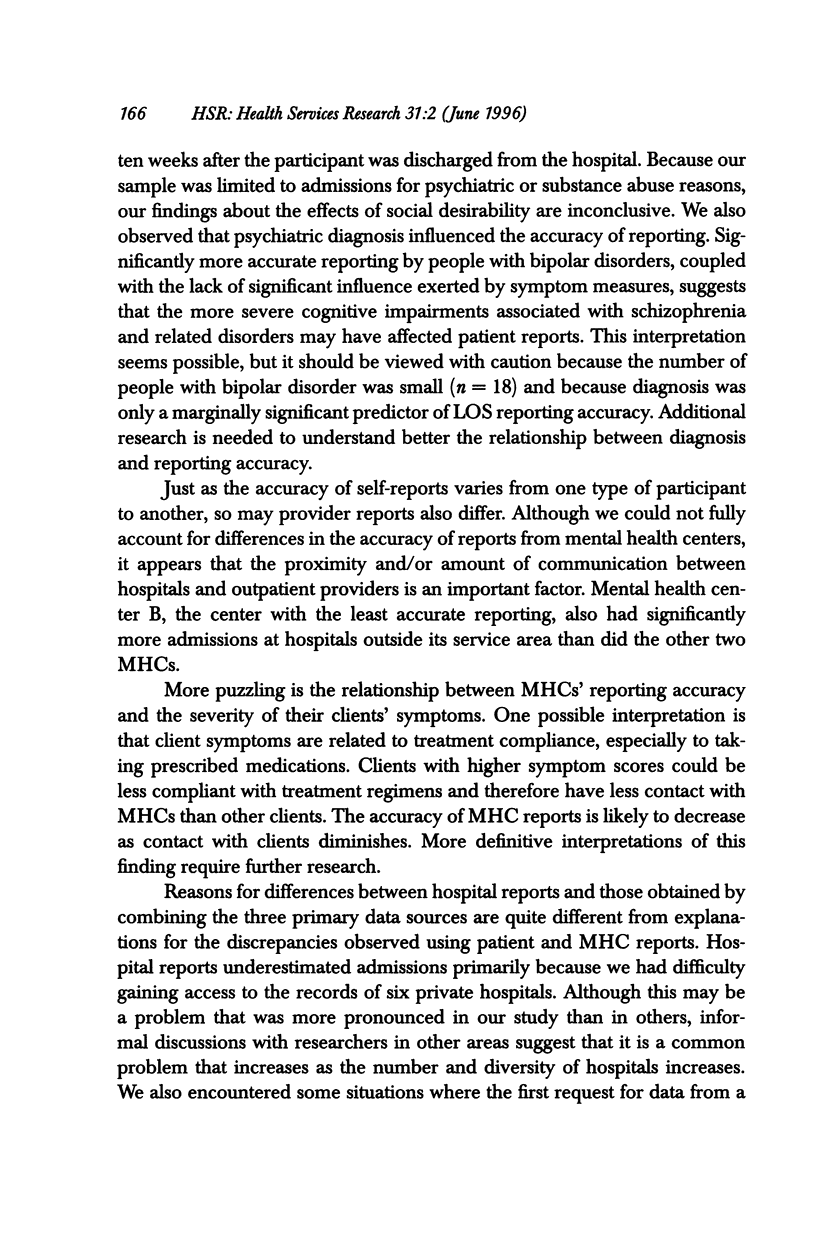



Selected References
These references are in PubMed. This may not be the complete list of references from this article.
- Bartko J. J., Carpenter W. T., Jr On the methods and theory of reliability. J Nerv Ment Dis. 1976 Nov;163(5):307–317. doi: 10.1097/00005053-197611000-00003. [DOI] [PubMed] [Google Scholar]
- Burner S. T., Waldo D. R., McKusick D. R. National health expenditures projections through 2030. Health Care Financ Rev. 1992 Fall;14(1):1–29. [PMC free article] [PubMed] [Google Scholar]
- Dietzen L. L., Bond G. R. Relationship between case manager contact and outcome for frequently hospitalized psychiatric clients. Hosp Community Psychiatry. 1993 Sep;44(9):839–843. doi: 10.1176/ps.44.9.839. [DOI] [PubMed] [Google Scholar]
- Golding J. M., Gongla P., Brownell A. Feasibility of validating survey self-reports of mental health service use. Am J Community Psychol. 1988 Feb;16(1):39–51. doi: 10.1007/BF00906071. [DOI] [PubMed] [Google Scholar]
- Greenfield S., Nelson E. C., Zubkoff M., Manning W., Rogers W., Kravitz R. L., Keller A., Tarlov A. R., Ware J. E., Jr Variations in resource utilization among medical specialties and systems of care. Results from the medical outcomes study. JAMA. 1992 Mar 25;267(12):1624–1630. [PubMed] [Google Scholar]
- Hennessy K. D., Reed S. K. Validating self-reports of mental health service use in a chronic population. J Nerv Ment Dis. 1992 Jun;180(6):399–400. doi: 10.1097/00005053-199206000-00011. [DOI] [PubMed] [Google Scholar]
- Jobe J. B., White A. A., Kelley C. L., Mingay D. J., Sanchez M. J., Loftus E. F. Recall strategies and memory for health-care visits. Milbank Q. 1990;68(2):171–189. [PubMed] [Google Scholar]
- Kivlahan D. R., Heiman J. R., Wright R. C., Mundt J. W., Shupe J. A. Treatment cost and rehospitalization rate in schizophrenic outpatients with a history of substance abuse. Hosp Community Psychiatry. 1991 Jun;42(6):609–614. doi: 10.1176/ps.42.6.609. [DOI] [PubMed] [Google Scholar]
- Spector P. E., Bedell J. R. Measuring program effectiveness: self-report versus objective indicators of recidivism. Am J Community Psychol. 1982 Oct;10(5):613–616. doi: 10.1007/BF00894148. [DOI] [PubMed] [Google Scholar]
- Tarlov A. R., Ware J. E., Jr, Greenfield S., Nelson E. C., Perrin E., Zubkoff M. The Medical Outcomes Study. An application of methods for monitoring the results of medical care. JAMA. 1989 Aug 18;262(7):925–930. doi: 10.1001/jama.262.7.925. [DOI] [PubMed] [Google Scholar]
- Verbrugge L. M. Health diaries. Med Care. 1980 Jan;18(1):73–95. doi: 10.1097/00005650-198001000-00006. [DOI] [PubMed] [Google Scholar]
- Weeks M. F., Kulka R. A., Lessler J. T., Whitmore R. W. Personal versus telephone surveys for collecting household health data at the local level. Am J Public Health. 1983 Dec;73(12):1389–1394. doi: 10.2105/ajph.73.12.1389. [DOI] [PMC free article] [PubMed] [Google Scholar]
- Widlak P. A., Greenley J. R., McKee D. Validity of case manager reports of clients' functioning in the community: independent living, income, employment, family contact, and problem behaviors. Community Ment Health J. 1992 Dec;28(6):505–517. doi: 10.1007/BF00754195. [DOI] [PubMed] [Google Scholar]


